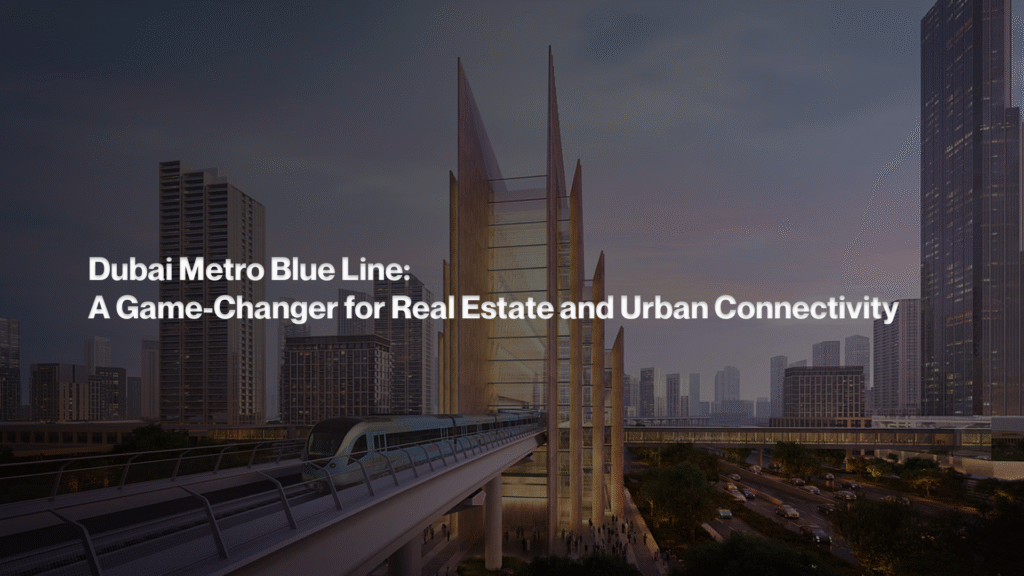Dubai, a global hub of innovation and infrastructure excellence, is once again setting benchmarks with the Dubai Metro Blue Line. As the emirate expands rapidly, this new addition to the city’s metro network is expected to reshape urban mobility, stimulate real estate demand, and enhance connectivity across key areas. Scheduled to be completed by 2029, the Blue Line is not just a transportation initiative—it is a catalyst for sustainable growth, investment opportunities, and urban modernization.
Strategic Overview: What is the Dubai Metro Blue Line?

The Dubai Metro Blue Line is a proposed 30-kilometer route that will connect five urban centers, namely Bur Dubai, Deira, Dubai Silicon Oasis, Dubai International Airport, and the planned Urban Tech District. The line will include 14 stations, 3 of which will be interchange stations connecting with Red and Green Lines, and 7 of which will be underground stations.
The route’s primary objective is to ease congestion, improve last-mile connectivity, and enhance access to business hubs, residential areas, and industrial zones.
Key Features of the Blue Line
Connectivity with Existing Metro Lines
- Seamless interchange with the Red Line at Centrepoint Station (Rashidiya)
- Interchange with the Green Line at Union Station
- Additional connectivity at Al Qiyadah Station
This interlinking is set to reduce travel time significantly, providing fast transit options across Dubai’s rapidly growing neighborhoods.
Advanced Infrastructure
- 14 stations, including 7 underground
- Driverless trains equipped with AI-powered automation
- State-of-the-art ticketing system
- Eco-friendly stations with solar integration and smart cooling
Real Estate Impact: Unprecedented Growth Along the Corridor
Rising Property Demand in Connected Zones
Areas that will be connected through the Blue Line corridor are already witnessing a surge in investor interest and development applications. Notably:
- Dubai Silicon Oasis: Anticipated to be a tech and residential magnet due to improved accessibility.
- Bur Dubai & Deira: Older communities with rich cultural heritage are being revitalized with transit-oriented development.
- International City and Academic City: High interest from expats, students, and families due to easier commutes.
Appreciation of Land Values
Based on previous metro expansions (Red and Green Lines), property prices within 800 meters of metro stations have increased by 15% to 25% over five years. Experts forecast a similar or greater jump along the Blue Line.
Boost in Off-Plan and Rental Markets
The Blue Line is creating speculative demand for off-plan projects in the corridor. Developers are launching premium units near upcoming stations to capitalize on rental yield expectations and location desirability.
Urban Connectivity: Solving the First and Last-Mile Problem
Micro-Mobility Integration
The Blue Line project isn’t limited to trains. It includes the integration of:
- Electric buses and e-scooters
- Bicycle tracks and pedestrian walkways
- Park-and-ride facilities
This aims to offer a multimodal transport ecosystem that eliminates dependency on personal vehicles.
Reduction in Commute Times
By creating direct lines to job hubs, the metro will reduce commute times by up to 40%, promoting work-life balance and improving the overall quality of life for residents.
Environmental Sustainability and Economic Benefits
Green Mobility and Reduced Emissions
The Blue Line is part of Dubai’s strategy to cut carbon emissions by 30% by 2030. Encouraging public transit usage will:
- Reduce vehicular traffic
- Lower carbon footprint
- Promote eco-conscious urban living
Economic Spillover Effects
- Increased retail footfall around metro stations
- Boost in hospitality and commercial sectors
- Job creation in construction, operations, and tech maintenance
Urban Planning: Integration with Dubai 2040 Master Plan
The Dubai Metro Blue Line aligns with the Dubai 2040 Urban Master Plan, which prioritizes:
- Development of 20-minute cities
- Smart, connected communities
- Sustainable infrastructure and mixed-use districts
The metro is pivotal in transitioning Dubai into a global benchmark for sustainable urban development.
Investor Insights: Why the Blue Line Matters to Real Estate Investors
High ROI Corridors
Neighborhoods like Muhaisnah, Ras Al Khor, Al Warqa, and International City Phase 2 are expected to become hot investment zones due to improved accessibility.
Diversified Tenant Pool
With easier access to educational institutions, tech parks, and healthcare centers, these zones will attract:
- Professionals
- Students
- Families
- Tourists
Lower Vacancy Risks
Rental properties near transit points historically show 90%+ occupancy rates, ensuring stable returns for landlords and investors.
Future Developments to Watch Along the Blue Line
Urban Tech District
Planned to become a global hub for urban innovation, this district will attract tech startups, R&D firms, and venture capitalists. Metro connectivity is essential for workforce movement.
Academic City Expansion
With expanded metro access, Academic City is expected to see new campus setups, dormitory developments, and student-centric amenities, making it a thriving educational hub.
Conclusion: A Transformational Infrastructure Project
The Dubai Metro Blue Line is more than a transportation initiative. It is an urban evolution engine that will transform real estate dynamics, streamline daily commutes, and support economic diversification in Dubai. For real estate investors, businesses, and residents, this mega-project represents an unmatched opportunity to be part of Dubai’s next growth phase.
Get ready for a new chapter in Dubai’s future—where connectivity meets opportunity.
